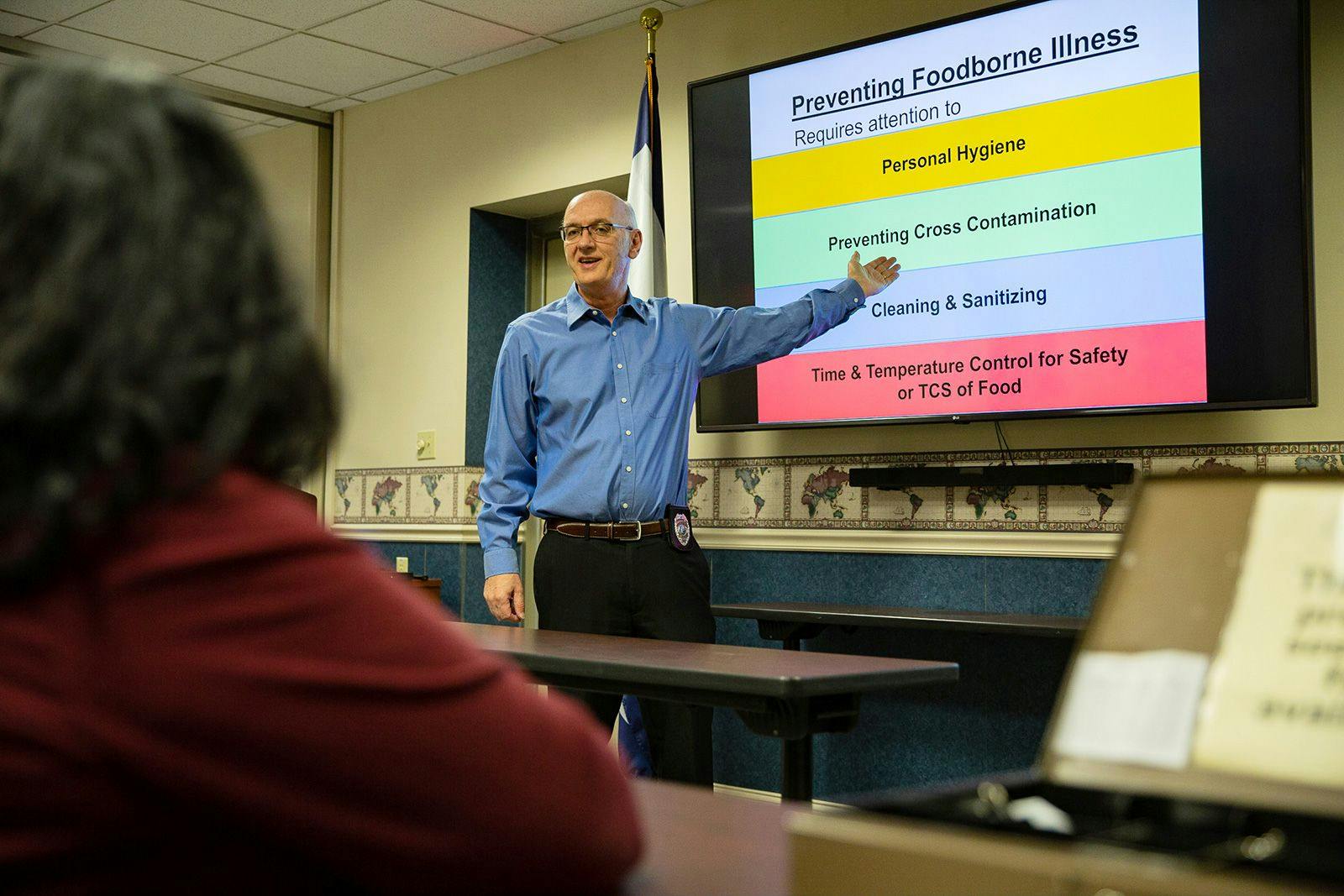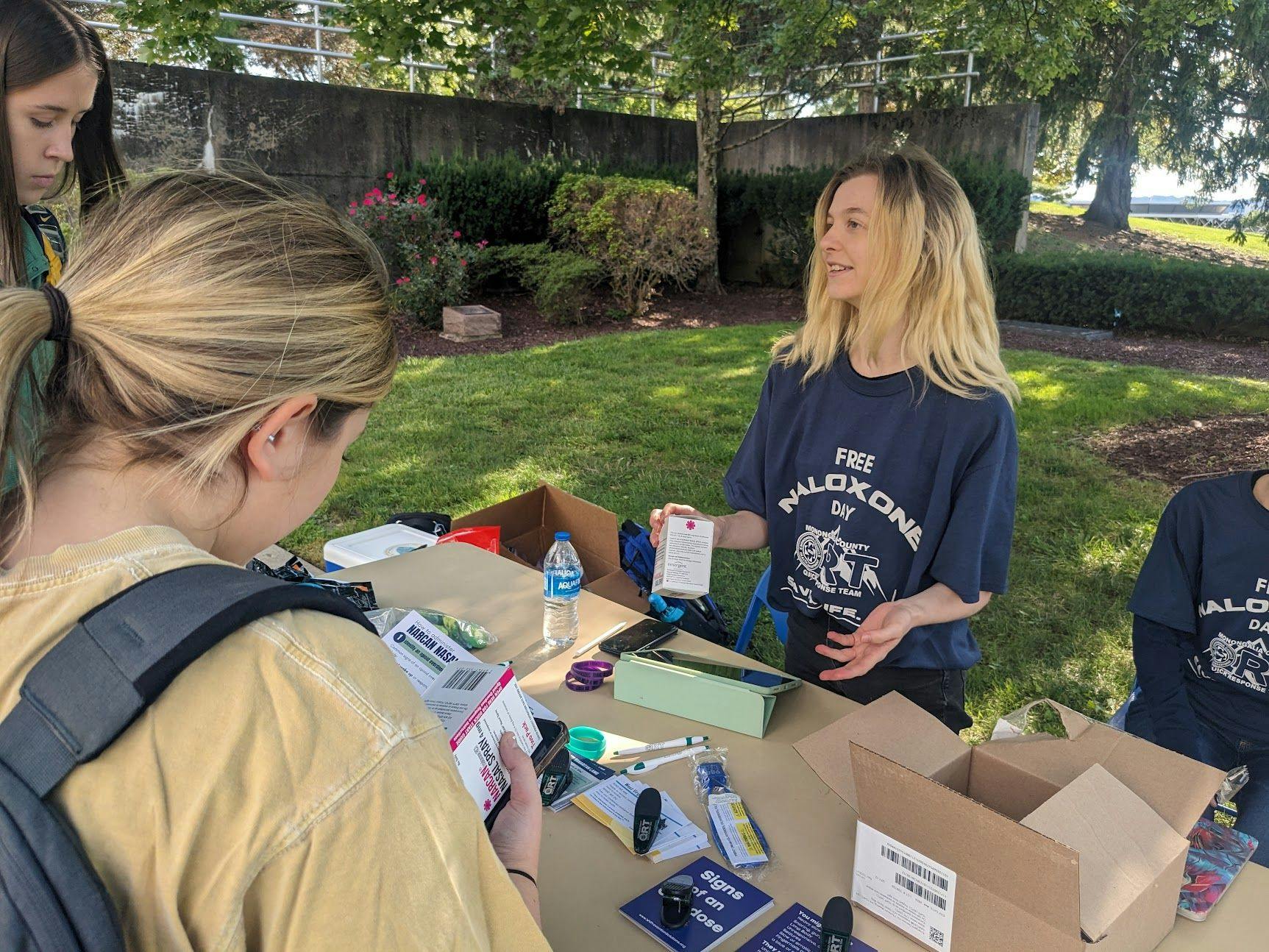Community Training
For Your Convenience
Monongalia County Health Department offers training in naloxone (Narcan) administration, Stop the Bleed and Cardiopulmonary Resuscitation (CPR) through its Threat Preparedness program, as well as Food Safety and Certified Pool Operator training through Environmental Health.
The average EMS response time is approximately seven minutes. Within four minutes you can bleed to death from a major injury or have permanent brain damage from lack of oxygen due to cardiac arrest. You can save a life until help arrives.
Individuals in the Monongalia County area who wish to set up training for five or more individuals can contact Joe Klass, chief of operations for Monongalia County Health Department’s Threat Preparedness program, at Joseph.L.Klass@wv.gov.
Those who want to learn more about Food Safety Training can click here to see the options Monongalia County Health Department offers.
And individual interested in taking the Certified Pool Operators course can click here.
CPR

CPR is an emergency lifesaving procedure performed when the heart stops beating. Immediate CPR can double or triple chances of survival after cardiac arrest, according to the American Heart Association. CPR is highly effective in restoring blood circulation and oxygenation to vital organs during a cardiac arrest.
Participants will use both adult and infant CPR dolls to learn hands-on CPR techniques.
If performed in a timely manner, it is estimated that CPR could save 100,000-200,000 lives annually in the United States.
American Heart Association CPR training is broken up into two types: Heartsaver ($65 per student) and Basic Life Support (BLS) ($60 per student). Heartsaver is for non-medical personnel and focuses on CPR/AED use in the community. BLS is for medical providers or those who want to be medical providers and focuses on CPR/AED use in health-care or first responder settings.
Upon successful completion of course, students will get a two-year CPR card from the American Heart Association.
Class length: Three to four hours, depending on class size and type of class (Heartsaver vs BLS)
Food safety training

Monongalia County Health Department offers three levels of food safety training: food manager certification, person-in-charge training and food worker training.
Download the 2024 Food Safety Training Schedule
Food worker training is required for all persons involved in preparing, storing or handling food in restaurants and other facilities offering food for sale to the public.
Class length is about 45 minutes. Registration begins 30 minutes prior to class. It's best to arrive early because seating and parking can be limited. A photo ID is required for registration.
The training costs $10 per year. Cards expiring in one, two ($20) or three years ($30) are available.
Online food worker training
- MCHD is pleased to offer online food worker training provided by StateFoodSafety.com. The course costs $20. It takes about two hours to complete and you must pass a test at the end.
- StateFoodSafety is the only online food service worker course we accept. Please be sure to take the Monongalia County course.
- Course registration will ask for the name and address of the facility or volunteer organization you work for, so it will be helpful to have that information available before you start. If you are not employed or not volunteering, please put N/A in those fields.
- We now have three options for the Online Food Worker Training Course. Click on a link below to take the course that best suits your needs:
- Option 1: one-year certification valid in Monongalia County only ($20)
- Option 2: one-year certification valid statewide ($25)
- Option 3: two-year certification valid statewide ($30)
- Option 4: three-year certification valid statewide ($35)
- Off-site food worker training
- Many employers and organizations ensure their workers comply with training requirements by sponsoring an onsite food worker course. MCHD is pleased to offer this service for groups of 20 or more.
- The cost is typically $200 plus card fees. Please contact 304-943-7773 to schedule a course.
- Temporary food worker training
- We offer temporary food worker cards every weekday (except for holidays) from 9-11 a.m. and 2-3 p.m. Candidates must study informational sheets (available below) and then complete a 10-question worksheet.
- Temporary cards cost $1 for each week issued. All cards expire the day of the next scheduled food workers class. Temporary card holders are expected to attend that class.
- Download Temporary Food Worker Study Material
Online person-in-charge training
The Food Code requires a designated PIC to be in the food establishment during all hours of operation (2- 101.11(A)). The PIC is required to demonstrate knowledge of foodborne disease prevention, HACCP principles, and the requirements of the Food Code. The Monongalia County Health Department's online PIC course is available with a fee of $65. You will have 30 days to complete the course once you create your account. It takes about four hours from start to finish and you must pass a test at the end. Please have the name and address of your food service facility available for the registration process. You may read about the course, watch a preview video and take the course here.
Food manager certification ServSafe
The 2013 Food Code requires all food establishments to have at least one management level employee who is certified in food protection by passing an American National Standards Institute (ANSI)-accredited exam. Our Food Manager Training Course will help to prepare you to meet this requirement.
At the end of the course, we will proctor the National Registry of Food Safety Professionals CFPM exam. A score of at least 75% is required for certification.
The course costs $150 per person; this includes the exam fee. It is day and half in length, meeting from 8:30 a.m.-4 p.m. the first day. The second day from 8:30 a.m.-noon.
Individuals who are not fluent in English are encouraged to bring a translator. The exam itself is available in several languages.
Pre-registration with payment is required at least 21 days prior to the class. You must provide a photo ID prior to taking the test.
A one-year food worker card will be issued to all class attendees.
Certified food manager exam
Well-qualified candidates can take the ServSafe exam without the course. A score of at least 75% is required for certification.
The exam-only option is $100; an optional study manual can be purchased at any time prior to the test for $25.
You must pre-register with payment no later than 21 days prior to the test date.
For testing purposes, arrive at 8:30 a.m. You must provide a photo ID prior to taking the test.
Onsite registration begins 30 minutes before testing times.
To pre-register, use the ServSafe application and select the Exam-Only option.
Food manager certification National Registry
The 2013 Food Code requires all food establishments to have at least one management level employee who is certified in food protection by passing an American National Standards Institute (ANSI)-accredited exam. Our Food Manager Training Course will help to prepare you to meet this requirement.
At the end of the course, we will proctor the National Registry of Food Safety Professionals CFPM exam. A score of at least 75% is required for certification.
The course costs $150 per person; this includes the exam fee. It is day and half in length, meeting from 8:30 a.m.-4 p.m. the first day. The second day from 8:30 a.m.-noon.
Individuals who are not fluent in English are encouraged to bring a translator. The exam itself is available in several languages.
Pre-registration with payment is required at least 21 days prior to the class. You must provide a photo ID prior to taking the test.
A one-year food worker card will be issued to all class attendees.
Certified food manager exam
Well-qualified candidates can take the National Registry of Food Safety Professionals CFPM exam without the course. A score of at least 75% is required for certification.
The exam-only option is $100; an optional study manual can be purchased at any time prior to the test for $25.
You must pre-register with payment no later than 21 days prior to the test date.
For testing purposes, arrive at 8:30 a.m. You must provide a photo ID prior to taking the test. Onsite registration begins 30 minutes before testing times.
To pre-register, use the Manager's Class Registration form and select the Exam-Only option.
Naloxone (Narcan)

Naloxone, also known by the brand name Narcan, is a safe and easy-to-use medication used to reverse the effects of an opioid overdose. Anyone can carry naloxone and be in the position to help a friend, family member or stranger by administering naloxone and then calling 911 to get help.
The Monongalia County QRT, a multi-agency group led by Monongalia County Health Departments, promotes naloxone education with private classes as well as Save a Life Day events that are held periodically in Monongalia County. Classes can be held for groups or individuals.
Class length: 45 minutes
Stop the Bleed
Stop the Bleed training will provide instruction on how to recognize and treat life threatening bleeding. STB students will learn how to apply direct pressure to a wound; how to pack a wound to control bleeding and how to correctly apply a tourniquet, either an actual tourniquet or an improvised one.
Class length: One hour